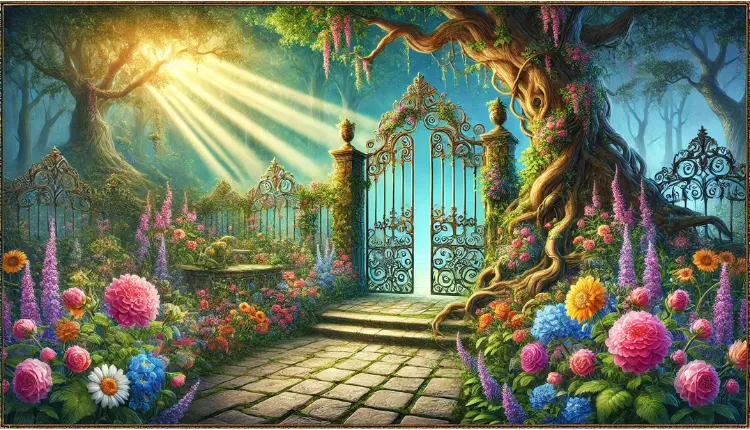When Mary Lennox came to Misselthwaite Manor, she was not the sort of child anyone wanted around: she was sickly and sullen, pale from too many years indoors. She had grown up in a big house in India where no one had much time for her, so the little girl wandered rooms alone, nannies whispering how “the poor thing is spoiled” while they half-watched her. When her parents died suddenly, Mary was shipped across the sea to Yorkshire to an uncle she had never met.
Misselthwaite Manor was a place of walls and echoes. The house seemed too large for its people—just a stern housekeeper, Mrs Medlock, and an occasional cook or gardener. Mary had never known so much silence, but even that was better than the cold wind howling outside. It was winter, and the hills stretched out grey and barren beyond her window as if the world had died.
“You’re not to trouble Master Craven,” Mrs. Medlock told her firmly. “And don’t go wandering about. This is no place for mischief.”
Mary didn’t care. She was too bored to want mischief, but it turned out she wasn’t good at sitting still for long. When the weather warmed, Mary ventured outdoors with her heavy coat buttoned to the chin. For days, she wandered along the edges of the gardens, past the trimmed hedges and orderly flower beds, and into tangled patches of forgotten land.
It was on one of these walks that she first saw the wall: it was quite high and had ivy spilling down it like a green waterfall. Something about it made Mary stop. She could feel there was a story there, though no one had told her one. And after circling for hours, she found a door hidden beneath the leaves – a small, wooden, and tightly locked door.
That night, she asked Martha, the maid, “What’s behind the wall?”
Martha paused while turning down the bedcovers. “It’s the old garden. Master Craven locked it up years ago after his wife died, and no one’s been in since.”
“Why?” Mary asked sharply.
“Because it reminds him of her, I suppose. She loved it so,” Martha said with a shrug.
Mary spent that night dreaming of keys and climbing vines.
The next morning, she met Ben Weatherstaff, the gruff gardener. He was the first to speak to her without treating her like something fragile.
“Your cheeks are turning pink, Miss,” he said. “Bit of air’s doing you good.”
“What garden is behind that wall?” Mary blurted.
Ben narrowed his eyes, “You’ve been nosing about. Best leave it alone.”
But Mary was stubborn. Day after day, she returned to the wall, pressing her ear to it as if she could hear the flowers whispering. She made sure to explore every inch of the grounds, and at last, just as she was about to give up, she found it! The key was half-buried in the dirt, and her small hands trembled as she held up the shiny, cold thing.
When she unlocked the door, it opened with a long, creaking sigh. It sounded like the garden itself was waking up from a deep slumber.
At first glance, it wasn’t a garden at all. It was a jungle: weeds as tall as Mary swallowed the paths; ivy clung to statues; and wild roses snarled like cats against the gates. But beneath the tangle, something stirred. The garden was alive.
Mary knelt and pulled back a clump of weeds, discovering a delicate crocus pushing up through the earth. It was pale but determined like it refused to be forgotten.
She spent every day inside the walls after that, tugging weeds, brushing dirt from the roots, and whispering softly to the plants she found. “Wake up now,” she would say.
Her hands grew rough and red from digging, and her legs grew strong from running through the grass. Ben Weatherstaff started watching her from afar, pretending not to notice when she waved at him.
And it wasn’t just her physique getting better. Something else changed, too: Mary began to smile.
One afternoon, as she crouched beside a patch of roses, she heard a rustling behind her. Turning quickly, she saw a boy—thinner than her, with dark hair and pale skin. His face looked surprised like hers must have been when she first found the garden.
“Who are you?” Mary demanded.
“I’m Colin. This is my house,” the boy snapped back. “Who are you?”
“Mary Lennox,” she said. “And this is my garden.”
Colin had been hidden away inside Misselthwaite Manor for years, convinced he was sick, just as Mary had once been. He had grown frail and frightened of the world; he hated the sunlight because he thought it would make him weaker, and he hated his father for not loving him enough.
But Mary was not the kind of girl to let someone mope. “Come on,” she said, pulling him by the hand. “If you can walk to the garden, you’re not too sick.”
And so, slowly, stubbornly, Colin came. At first, Ben had to carry him, his legs wobbling under him like a baby bird. But day by day, the garden worked its magic. Colin breathed the fresh air; he laughed when Mary chased robins or fell backwards into the grass. The sunlight didn’t hurt him. Instead, it turned his skin golden, and he grew stronger with every step he took until, finally, one afternoon, he walked across the garden without help.
His father, Master Craven, returned to the house one evening, drawn by something he couldn’t explain. For the first time in years, he felt restless, like something in his soul was calling him home. He wandered the grounds and was shocked to hear laughter from behind the walled garden. When he pushed open the old wooden door, he couldn’t believe his eyes.
There was his son—his sickly, broken boy—running through the grass with Mary. Both of them were flushed and laughing, dirt smeared on their hands. And the garden, his wife’s beautiful garden, was in full bloom: roses tumbled over trellises; lilies nodded in the wind; and the smell of earth and sunlight hung sweetly in the air.
Master Craven fell to his knees, for the sight of his son alive and well, of the garden alive and well, broke something open in him. He wept and wept—healed not just by his son but by the place his wife had loved so dearly.
The garden stayed their secret though it grew too beautiful to keep. By summer, the children were brown with sunshine and strong with work. Mary didn’t look sickly anymore; she looked like a wildflower, alive and full of light. And as for Colin, who had once feared life itself, he laughed louder than anyone.
Ben Weatherstaff often shook his head and muttered, “It’s the garden, you see. Nothin’ better for a body than a bit of green.”
Mary knew that, too. The garden had given her something no one else ever had: purpose. It might appear that she healed it, but in fact, it had healed her.
And it healed Colin, and it healed his father.
And like a secret too good to keep, it reminded anyone who entered that life—no matter how broken it seems—will grow back if you give it light, warmth, and time.
Searching for fairy tales that bring more than just entertainment?
If your answer is yes, then step into the magical world of Fairy Tales with Moral Lessons on Storyious, where each enchanting story is sprinkled with wisdom and wonder. From talking animals and brave children to magical kingdoms and hidden truths, our moral fairy tales are crafted to delight young minds while nurturing character and kindness. These stories are perfect for quiet evenings, classroom reads, or family time, delivering timeless lessons in the most imaginative ways. Whether it’s about honesty, courage, or kindness, each tale leaves behind a beautiful message. So, start exploring now and let your imagination bloom through stories that both inspire and teach.







Comments